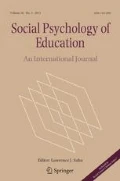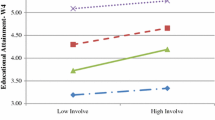Abstract
This study examined the relationship between parental involvement, self-regulated learning (SRL), and reading achievement through analyzing the fifth grade data from the Early Childhood Longitudinal Study, Kindergarten Class of 1998–1999 (ECLS-K). The results identified six dimensions of parental involvement that are likely to foster SRL of fifth graders: School Involvement, TV Rules, Homework Help, Homework Frequency, Parental Education Expectations, and Extracurricular Activities. Of these three dimensions, Parental Education Expectations, School Involvement, and Homework Help, were found to have stronger effects on SRL; Parental Education Expectations was found to have the strongest beneficial effect on SRL. The results also suggest that SRL mediates the relationship between parental involvement and reading achievement. These results provide a framework for parents to help their children develop SRL skills and guide educators and school administrators as they intend to increase parental involvement and its effectiveness.
Similar content being viewed by others
References
Bandura A. (1986) Social foundations of thought and action: A social cognitive theory. Prentice-Hall, Englewood Cliffs, N.J.
Bandura A. (1989) Human agency in social cognitive theory. American Psychologist 44(9): 1175–1184
Bembenutty H. (2006) Parental involvement, homework, and self-regulation. Academic Exchange Quarterly 10(4): 18–23
Boekaerts M. (1999) Self-regulated learning: Where we are today. International Journal of Educational Research 31(6): 445–457
Bozionelos N. (2003) Causal path modeling: What it does and what it does not tell us. Career Development International 8(1): 5–11
Bronson M. B. (2000) Self-regulation in early childhood: Nature and nurture. The Guilford Press, New York
Cooper H., Valentine J. C., Nye B., Lindsay J. J. (1999) Relationship between five after-schoolactivities and academic achievement. Journal of Educational Psychology 91(2): 369–378
Cureton E. E., D’Agostino R. B. (1983) Factor analysis: An applied approach. Lawrence Erlbaum Associates, Hillsdale, NJ
Dumais S. A. (2006) Elementary school students’ extracurricular activities: The effects of participation on achievement and teachers’ evaluations. Sociological Spectrum 26(2): 117–147
Eccles J. S., Templeton J. (2002) Extracurricular and other after-school activities for youth. Review of Research in Education 26(1): 113–180
Eisenberg M. E., Sieving R. E., Bearinger L. H., Swain C., Resnick M. D. (2006) Parents’ communication with adolescents about sexual behavior: A missed opportunity for prevention?. Journal of Youth and Adolescence 35(6): 893–902
Elder G. H., Pavalko E. K., Clipp E. C. (1993) Working with archival data: Studying lives. Sage, Newbury Park, CA
Epstein J. L. (1995) School-family-community partnerships: Caring for the children we share. Phi Delta Kappan 76(9): 701–712
Fan X., Chen M. (2001) Parental involvement and students’ academic achievement: A meta-analysis. Educational Psychology Review 13(1): 1–22
Grolnick W. S., Kurowski C. O., Gurland S. T. (1999) Family processes and the development of children’s self-regulation. Educational Psychologist 34(1): 3–14
Grolnick W. S., Slowiaczek M. L. (1994) Parents’ involvement in children’s schooling: A multidimensional conceptualization and motivational model. Child Development 65(1): 237–252
Guthrie J. T., Wigfield A., Metsala J. L., Cox K. E. (1999) Motivational and cognitive predictors of text comprehension and reading amount. Scientific Studies of Reading 3(3): 231–256
Hoover-Dempsey K. V., Battiato A. C., Walker J. M. T., Reed R. P., DeJong J. M., Jones K. P. (2001) Parental involvement in homework. Educational Psychologist 36(3): 195–209
Hoover-Dempsey K. V., Sandler H. M. (1995) Parental involvement in children’s education: Why does it make a difference?. Teachers College Record 97(2): 310–331
Hoover-Dempsey K. V., Sandler H. M. (1997) Why do parents become involved in their children’s education?. Review of Educational Research 67(1): 3–42
Hoover-Dempsey, K. V., & Sandler, H. M. (2005). Final performance report for OERI Grant # R305T010673: The social context of parental involvement: A path to enhanced achievement. Presented to Project Monitor, Institute of Education Sciences, U.S. Department of Education, March 22, 2005.
Keith T. Z., Keith P. B., Troutman G. C., Bickley P. G., Trivette P. S., Singh K. (1993) Does parental involvement affect eighth-grade student achievement? Structural analysis of national data. School Psychology Review 22(3): 474–496
Keith T. Z., Keith P. B., Quirk K. J., Sperduto J., Santillo S., Killings S. (1998) Longitudinal effects of parent involvement on high school grades: Similarities and differences across gender and ethnic groups. Journal of School Psychology 36(3): 335–363
Keith T. Z., Reimers T. M., Fehrmann P. G., Pottebaum S. M., Aubey L. W. (1986) Parental involvement, homework, and TV time—direct and indirect effects on high-school achievement. Journal of Educational Psychology 78(5): 373–380
Kutner M. H., Nachtsheim C. J., Neter J., Li W. (2004) Applied linear statistical models (5th ed.). McGraw-Hill/Irwin, Boston, MA
Marsh H. W. (1986) Verbal and math self-concepts: An internal/external frame of reference model. American Educational Research Journal 23(1): 129–149
Martinez-Pons M. (1996) Test of a model of parental inducement of academic self-regulation. Journal of Experimental Education 64(3): 213–227
Martinez-Pons M. (2002) Parental influences on children’s academic self-regulatory development. Theory Into Practice 41(2): 126–132
Myers S. S. (1991) Performance in reading comprehension-product or process?. Educational Review 43(3): 257–272
Nary S. (2004) Exploring pathways from television viewing to academic achievement in school age children. Journal of Genetic Psychology 165(4): 367–381
Nunnally J. C. (1978) Psychometric theory (2nd ed.). McGraw-Hill, New York
Ormrod J. E. (2006) Educational psychology: Developing learners (5th ed.). Pearson/Merrill Prentice Hall, Upper Saddle River, NJ
Pintrich P. R. (2000) The role of goal orientation in self-regulated learning. In: Boekaerts M., Pintrich P. R., Zeidner M. (eds) Handbook of self-regulation. Academic Press, San Diego, CA, pp 451–502
Preacher K. J., Hayes A. F. (2004) SPSS and SAS procedures for estimating indirect effects in simple mediation models. Behavior Research Methods, Instruments, & Computers 36(4): 717–731
Puustinen M., Pulkkinen L. (2001) Models of self-regulated learning: A review. Scandinavian Journal of Educational Research 45(3): 269–286
Reynolds A. J., Clements M. (2005) Parental involvement and children’s school success. In: Patrikakou E. N., Weissberg R. P., Redding S., Walberg H. J. (eds) School-family partnerships for children’s success. Teachers College Press, New York
Ridley-Johnson R., Cooper H., Chance J. (1983) The relation of children’s television viewing to school achievement and I.Q. Journal of Educational Research 76(5): 294–297
Riesch S. K., Anderson L. S., Krueger H. A. (2006) Parent–child communication Processes: Preventing children’s health-risk behavior. Journal for Specialists in Pediatric Nursing 11(1): 41–56
Rubin D. B. (1996) Multiple imputation after 18+ years. Journal of the American Statistical Association 91(434): 473–489
Schoon I., Parsons S., Sacker A. (2004) Socioeconomic adversity, educational resilience, and subsequent levels of adult adaptation. Journal of Adolescent Research 19(4): 383–404
Schunk D. H., Zimmerman B. J. (1997) Social origins of self-regulatory competence. Educational Psychologist 32(4): 195–208
Sheldon S. B., Epstein J. L. (2005) Involvement counts: Family and community partnerships and mathematics achievement. Journal of Educational Research 98(4): 196–206
Sobel M. E. (1982) Asymptotic confidence intervals for indirect effects in structural equation models. Sociological Methodology 13: 290–312
Souvignier E., Mokhlesgerami J. (2006) Using self-regulation as a framework for implementing strategy instruction to foster reading comprehension. Learning and Instruction 16(1): 57–71
Thompson F. T., Austin W. P. (2003) Television viewing and academic achievement revisited. Education 124: 194–202
Tourangeau, K., Nord, C., Lê, T., Pollack, J. M., & Atkins-Burnett, S. (2006). Early childhood longitudinal study, kindergarten class of 1998–1999 (ECLS-K), combined user’s manual for the ECLS-K fifth-grade data files and electronic codebooks (NCES 2006–032). U.S. Department of Education. Washington, DC: National Center for Education Statistics.
Walker J. M. T., Wilkins A. S., Dallaire J. R., Sandler H. M., Hoover-Dempsey K. V. (2005) Parental involvement: Model revision through scale development. Elementary School Journal 106(2): 85–104
Xu J., Corno L. (2003) Family help and homework management reported by middle school students. Elementary School Journal 103(5): 503–517
Zeidner M., Boekaerts M., Pintrich P. R. (2000) Self-regulation: Directions and challenges for future research. In: Boekaerts M., Pintrich P. R., Zeidner M. (eds) Handbook of self-regulation. Academic Press, San Diego, CA
Zimmerman B. J. (1990) Self-regulated learning and academic achievement: An overview. Educational Psychologist 25(1): 3–17
Zimmerman B. J. (1998) Academic studying and the development of personal skill: A self-regulatory perspective. Educational Psychologist 33(2–3): 73–86
Zimmerman B. J. (2000) Attaining self-regulation: A social cognitive perspective. In: Boekaerts M., Pintrich P. R., Zeidner M. (eds) Handbook of self-regulation. Academic Press, San Diego, CA, pp 13–39
Zimmerman B. J. (2002) Becoming a self-regulated learner: An overview. Theory Into Practice 41(2): 64–70
Zimmerman B. J., Bandura A. (1994) Impact of self-regulatory influences on writing course attainment. American Educational Research Journal 31(4): 845–862
Zimmerman B. J., Bandura A., Martinez-Pons M. (1992) Self-motivation for academic attainment: The role of self-efficacy beliefs and personal goal setting. American Educational Research Journal 29(3): 663–676
Zimmerman B. J., Bonner S., Kovach R. (1996) Developing self-regulated learners: Beyond achievement to self-efficacy. American Psychological Association, Washington, DC
Zimmerman B. J., Kitsantas A. (1997) Developmental phases in self-regulation: Shifting from process goals to outcome goals. Journal of Educational Psychology 89(1): 29–36
Zimmerman B. J., Kitsantas A. (1999) Acquiring writing revision skill: Shifting from process to outcome self-regulatory goals. Journal of Educational Psychology 91(2): 241–250
Zimmerman B. J., Kitsantas A. (2002) Acquiring writing revision and self-regulatory skill through observation and emulation. Journal of Educational Psychology 94(4): 660–668
Zimmerman B. J., Kitsantas A. (2005) Homework practices and academic achievement: The mediating role of self-efficacy and perceived responsibility beliefs. Contemporary Educational Psychology 30(4): 397–417
Zimmerman B. J., Martinez-Pons M. (1986) Development of a structured interview for assessing student use of self-regulated learning strategies. American Educational Research Journal 23(4): 614–628
Zimmerman B. J., Martinez-Pons M. (1988) Construct validation of a strategy model of student self-regulated learning. Journal of Educational Psychology 80(3): 284–290
Zimmerman B. J., Martinez-Pons M. (1990) Student differences in self-regulated learning: Relating grade, sex, and giftedness to self-efficacy and strategy use. Journal of Educational Psychology 82(1): 51–59
Zimmerman, B. J., & Schunk, D. H. (2001). Reflections on theories of self-regulated learning and academic achievement. In Zimmerman B. J. & Schunk D. H. (Eds.), Self-regulated learning and academic achievement: Theoretical perspectives (Vol. 2, pp. 289–307). Mahwah, NJ: Erlbaum.
Author information
Authors and Affiliations
Corresponding author
Rights and permissions
About this article
Cite this article
Xu, M., Kushner Benson, S.N., Mudrey-Camino, R. et al. The relationship between parental involvement, self-regulated learning, and reading achievement of fifth graders: a path analysis using the ECLS-K database. Soc Psychol Educ 13, 237–269 (2010). https://doi.org/10.1007/s11218-009-9104-4
Received:
Accepted:
Published:
Issue Date:
DOI: https://doi.org/10.1007/s11218-009-9104-4




